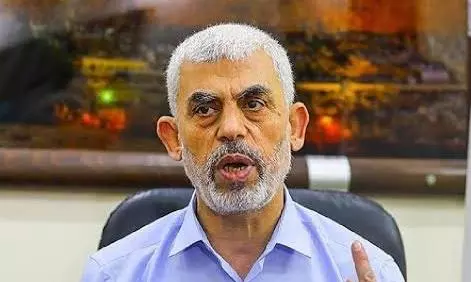
The death of Hamas leader Yahya Sinwar, allegedly killed in a recent Israeli airstrike, has sent shockwaves across the region and the world. Sinwar, known for his hardline stance and leadership role within the Hamas organization, was a central figure in the Israeli-Palestinian conflict. This development has raised significant questions about the future of Hamas, the potential for further escalation, and the broader geopolitical implications.
In this article, we’ll explore Yahya Sinwar’s background, his role within Hamas, the circumstances surrounding his reported death, and the global reactions to the news.
Who Was Yahya Sinwar?
Yahya Sinwar was one of the most prominent leaders of Hamas, an Islamist militant group designated as a terrorist organization by the United States, the European Union, and other nations. Born in the Khan Younis refugee camp in Gaza in 1962, Sinwar was involved in Palestinian activism from an early age.
He co-founded the Izz ad-Din al-Qassam Brigades, the armed wing of Hamas, and gained notoriety for his operational role within the organization. Sinwar was imprisoned by Israel for decades but was released in 2011 as part of a prisoner exchange. Upon his release, he quickly ascended to the upper echelons of Hamas, becoming one of the most influential figures in Gaza.
Circumstances of His Reported Death
Reports emerged that Yahya Sinwar was killed in a targeted airstrike by Israeli forces during the recent escalation of violence between Hamas and Israel. Israeli Defense Forces (IDF) had been intensifying their military campaign against Hamas targets in Gaza, and Sinwar was reportedly one of the key figures in their crosshairs. However, there is still ambiguity around his confirmed death, as Hamas has yet to issue an official statement confirming or denying the reports.
If confirmed, his death would be one of the most significant Israeli strikes against Hamas leadership in recent years. It comes in the context of ongoing tensions, rocket attacks, and airstrikes that have caused widespread destruction and loss of life in Gaza and southern Israel.
The Role of Yahya Sinwar in Hamas
Yahya Sinwar played a pivotal role in Hamas as a military strategist and political leader. As the de facto ruler of Gaza, he oversaw all aspects of Hamas governance, including its military operations and relations with other militant groups. His leadership style was marked by a willingness to engage in conflict with Israel while also maintaining ties with regional allies like Iran.
Sinwar’s reputation as a hardliner often put him at odds with more moderate voices within the Palestinian political landscape. Under his leadership, Hamas continued its rocket attacks on Israel while also negotiating ceasefires and prisoner exchanges when strategically advantageous.
Reactions from Israel and the International Community
The reported death of Yahya Sinwar has sparked a range of reactions. In Israel, there is a sense of relief, as Sinwar was seen as a key architect of the violence emanating from Gaza. Israeli officials have yet to confirm his death officially, but if true, it would mark a significant blow to Hamas’ leadership structure.
Globally, the reactions are mixed. While Israel’s allies, such as the U.S., may view Sinwar’s death as a victory in the fight against terrorism, other countries and international organizations are calling for restraint. There are fears that Sinwar’s death could lead to further violence in the region, as Hamas may seek revenge through increased rocket attacks or other forms of retaliation.
Impact on Hamas and the Future of the Israeli-Palestinian Conflict
If confirmed, the death of Yahya Sinwar will have significant implications for Hamas and its leadership. Sinwar’s loss could create a power vacuum within the organization, leading to internal struggles for leadership. It could weaken Hamas’ ability to coordinate attacks, at least in the short term.
However, there is also the possibility that Sinwar’s death could galvanize Hamas and its supporters, leading to more aggression in the conflict with Israel. Historically, targeted killings of crucial Hamas leaders have led to temporary escalations in violence, followed by periods of recalibration within the organization.
On the broader Israeli-Palestinian conflict, Sinwar’s death is unlikely to bring any immediate resolution. The fundamental issues driving the conflict—territorial disputes, sovereignty, and the right of return for Palestinian refugees—remain unresolved. While Sinwar’s death may weaken Hamas, it will not eliminate the organization’s influence or end the cycle of violence that has characterized the region for decades.
Global Diplomatic Reactions
World leaders have expressed concern about the potential fallout from Sinwar’s reported death. The United Nations, the European Union, and various Arab states have called for calm and urged both sides to return to negotiations. Egypt, which has often acted as a mediator between Hamas and Israel, is reportedly working behind the scenes to prevent further escalation.
The U.S. State Department has reiterated its support for Israel’s right to self-defence while also calling for proportionality in its military actions to avoid civilian casualties. Meanwhile, countries like Iran, a long-time supporter of Hamas, have condemned the airstrike and called for resistance against Israeli “aggression.”
Conclusion
The reported killing of Yahya Sinwar, if confirmed, represents a significant moment in the ongoing conflict between Hamas and Israel. His death may destabilize Hamas in the short term, but it is unlikely to bring about a lasting resolution to the conflict. As the region braces for potential retaliation, the international community continues to call for a de-escalation of violence and a return to diplomacy.
The situation remains fluid, and as more details emerge, the impact of Sinwar’s death on Hamas, the Israeli-Palestinian conflict, and global geopolitics will become more apparent. The region stands on edge for now, with both sides preparing for what could come next.